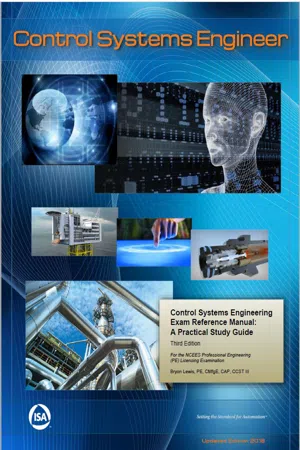
Control Systems Engineering Exam Reference Manual: A Practical Study Guide for the NCEES Professional Engineering (PE) Licensing Examination Fourth Edition
- English
- ePUB (mobile friendly)
- Available on iOS & Android
Control Systems Engineering Exam Reference Manual: A Practical Study Guide for the NCEES Professional Engineering (PE) Licensing Examination Fourth Edition
About this book
Are you preparing to take the NCEES PE Control System Engineer examination? Review essential topics in process control systems with the Control Systems Engineering Exam Reference Manual: A Practical Study Guide, now in its fourth edition.This comprehensive manual helps to prepare the experienced engineer or designer to pass the PE exam with a specialization in Control System Engineering. In addition to covering a broad range of subjects including electrical, mechanical, and chemical engineering, it also includes practical example problems, required state and federal codes, standard documentation, and design practices using real-world plant examples. Author Bryon Lewis has over 30 years of experience in electrical, mechanical, instrumentation, and control systems and has participated in projects for Shell Oil, Exxon, Diamond Shamrock, Eli Lilly Pharmaceuticals, Proctor and Gamble, the Johnson Space Center, and more.
Information
Table of contents
- Cover
- Title
- Copyright
- Contents
- Introduction to This Study Guide
- Chapter 1: Welcome to Control Systems Engineering
- Chapter 2: Exam General Information
- Chapter 3: Reference Materials for the Exam
- Chapter 4: Measurement Standards and Terminology
- Chapter 5: Fluid Mechanics in Process Control
- Chapter 6: Temperature Measurement and Calibration
- Chapter 7: Pressure Measurement and Calibration
- Chapter 8: Level Measurement and Calibration
- Chapter 9: Flow Measurement and Calibration
- Chapter 10: Weight Measurement and Calibration
- Chapter 11: Process Analyzers
- Chapter 12: Sensors for Fire and Rotating Equipment
- Chapter 13: Process Control Valves and Actuators
- Chapter 14: Pressure-Relief Valves and Rupture Disks
- Chapter 15: Review of Feedback Control Fundamentals
- Chapter 16: Review of Frequency Response Fundamentals
- Chapter 17: Control Theory and Controller Tuning
- Chapter 18: Communications and Control Networks
- Chapter 19: Digital Logic in Control Systems
- Chapter 20: Motor Control and Logic Functions
- Chapter 21: Analog Circuits in Control Systems
- Chapter 22: Overview of Motion Controller Applications
- Chapter 23: Electrical Systems and Power Quality
- Chapter 24: Emergency Standby Systems
- Chapter 25: Hydraulics and Pneumatics
- Chapter 26: Fluid Power Schematic Symbols
- Chapter 27: ISA Standards for Documentation
- Chapter 28: Overview of Safety Instrumented Systems
- Chapter 29: Overview of NEC/NFPA and Other Codes
- Chapter 30: Equations for Pumping, Piping, and Sizing Motors
- Chapter 31: Calculating Volume in Tanks
- Chapter 32: Exam Sample Questions
- Chapter 33: Guide to the Fisher Control Valve Handbook
- Appendix and Data Tables
Frequently asked questions
- Essential is ideal for learners and professionals who enjoy exploring a wide range of subjects. Access the Essential Library with 800,000+ trusted titles and best-sellers across business, personal growth, and the humanities. Includes unlimited reading time and Standard Read Aloud voice.
- Complete: Perfect for advanced learners and researchers needing full, unrestricted access. Unlock 1.4M+ books across hundreds of subjects, including academic and specialized titles. The Complete Plan also includes advanced features like Premium Read Aloud and Research Assistant.
Please note we cannot support devices running on iOS 13 and Android 7 or earlier. Learn more about using the app